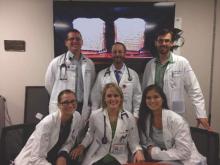In hospitals all over the country July is a time of change – the old house staff have left and the new house staff have arrived. It is a time of hope and a time of fear; it is a time of renewal and promise. Hidden in a small conference room deep in the recesses of Abington Hospital–Jefferson Health, a humble group of physicians – two interns, two second-year residents, a lone third-year resident, and one attending gathered and sought to divine the deepest, most secret, yet important rules for growing and surviving the first year of medical residency training. These are rules that form the foundation for a year, and then a lifetime as a physician. It is our hope that these rules will be shared, posted on Facebook, tweeted, discussed, agreed/disagreed with, and ultimately found to be of use to nascent physicians in clarifying a foundational set of work principles. Every human endeavor has a basic set of principles, which, when learned and followed, allows one to confront more easily the challenges of daily life. Sometimes those rules are written; more often they are unwritten. To the degree that we can understand what these rules are and learn them quickly we benefit in our day-to-day activities. These principles serve as an intellectual map to guide us through the complexities of our work with others and our feelings about ourselves.
The 10 Commandments of Internship
1. Know your patient. (Nosce patiens tuum.)
2. When uncertain, ask for help.
3. Don’t act smarter than you are.
4. Understand you’re smarter than you feel.
5. Remember, when the consultant attending yells at you, it’s not about what you did; it’s about how he was brought up.
6. Treat everyone with respect.
7. Don’t forget to call your mother.
8. Be on time.
9. Not all diarrhea is C. diff.
10. Enjoy each day.
Commentary
1. Know your patient – this is the first rule. As the intern the expectations are unique. Unlike a medical student you are not expected to know the Krebs cycle. Unlike the upper year you do not have to know how to handle a hypertensive emergency. However, you are the only one in the hospital who has to know everything about your patient. You better know if someone’s potassium is low, and what was done about it. You are the only one who has to know, up to the minute, every important and seemingly unimportant thing about your patient. Your patient is your most important textbook; learn him or her well and you will learn medicine.
2. When uncertain, ask for help – you are expected to know nothing, which means anything you know is a bonus. If you are uncertain, you need to ask for help. Know your limits – in knowledge, in efficiency, in endurance. The only time you will get yourself in trouble is when you fall into the trap of hubris (yes, look it up). Remember the saying that has been attributed to a number of people from Mark Twain to Satchel Paige to Charles F. Kettering: “It ain’t what you don’t know that will get you into trouble. It’s what you know for sure that just ain’t so.”
3. Don’t think you are smarter than you are – this is a corollary to rule No. 2. It is meant to keep you out of trouble. No one likes someone who walks around acting like he is smarter than everyone else. There is no better way to get others to take pleasure in your screwups than walking around with an attitude of being better or smarter than them. Oh, and – you will have screwups. At the same time, don’t be afraid to question authority. In so doing you will either clarify a question, or find out that you were right. Ultimately it is through independent thinking and the questioning of authority that all knowledge advances.
4. Understand you’re smarter than you feel – you are going to work with a lot of really smart people this year. You’re one of them. Even when you don’t feel particularly smart, realize no one fakes his way in; neither did you. You are there on the hospital floor and in your program for a reason, and that reason is that you have consistently worked hard and performed well. Respect yourself. Do not crumble over feedback; Do not crumble over feedback; you are capable, intelligent, and worthy.
5. Remember, when the consultant attending yells at you, it’s not about what you did; it’s about how he was brought up. It is a reasonable expectation that others, even those who have a lot more experience than us, give us feedback in a measured and respectful manner. Nonetheless, when consulting a subspecialist, know what question you are asking – before you ask. When someone’s response is out of proportion to what you believe to be reasonable, it probably reflects more on them than you. Appreciate both the positive and negative feedback you get; it means that someone cared enough to take the time to help you grow.


